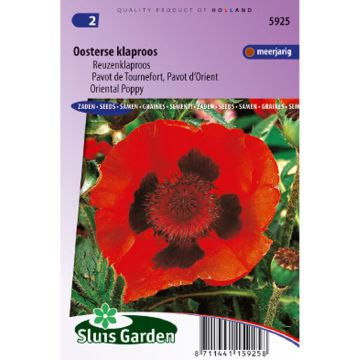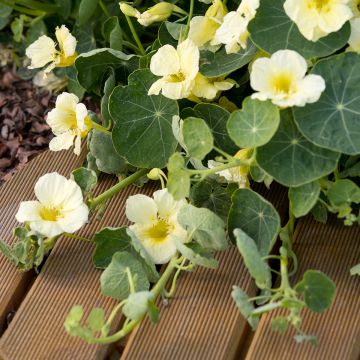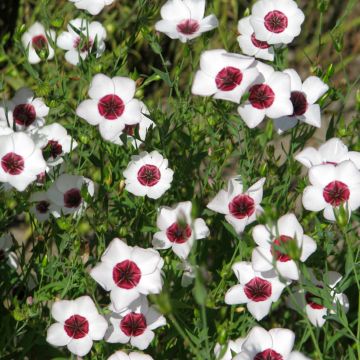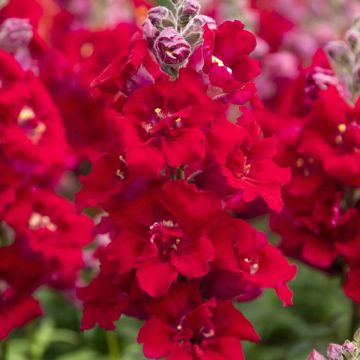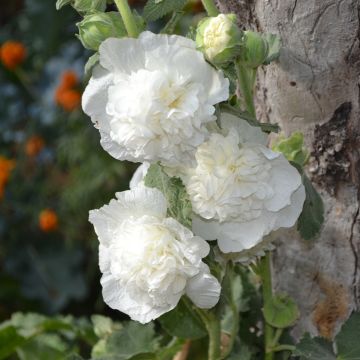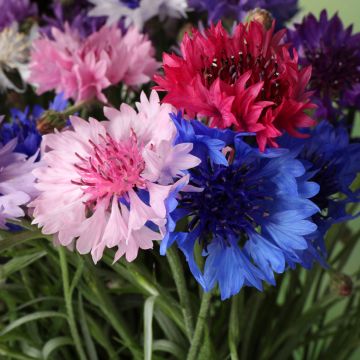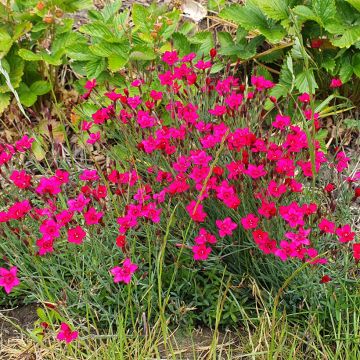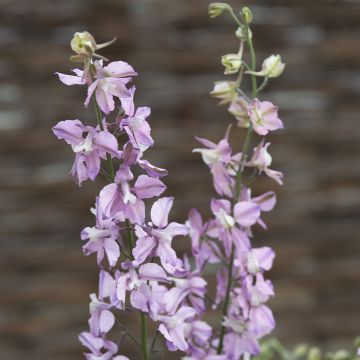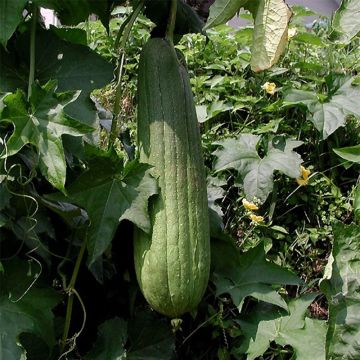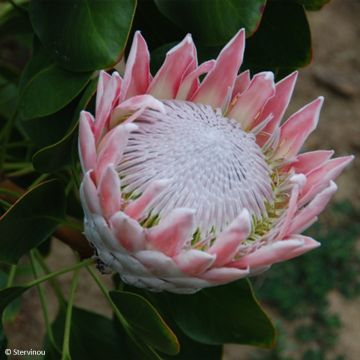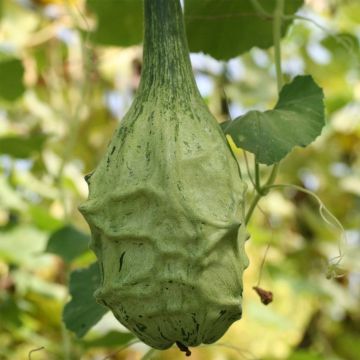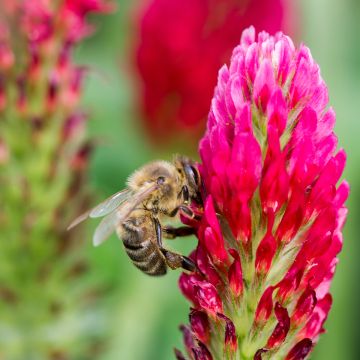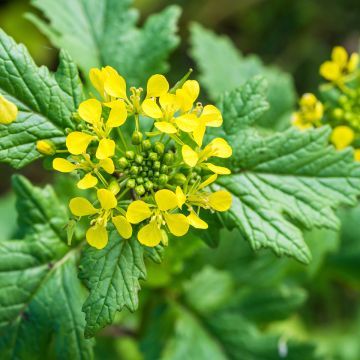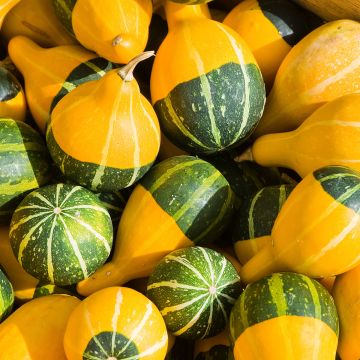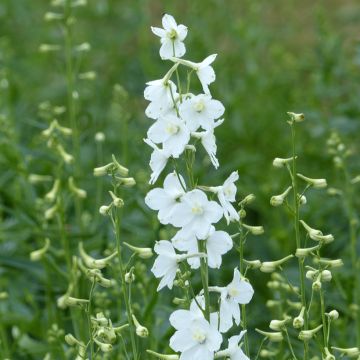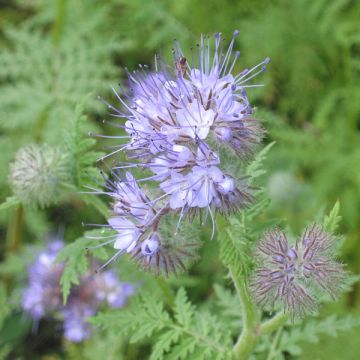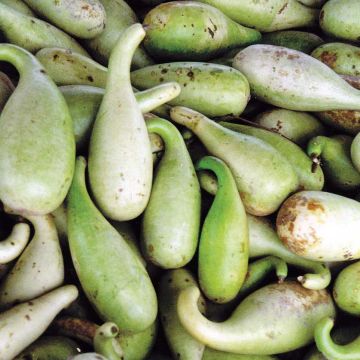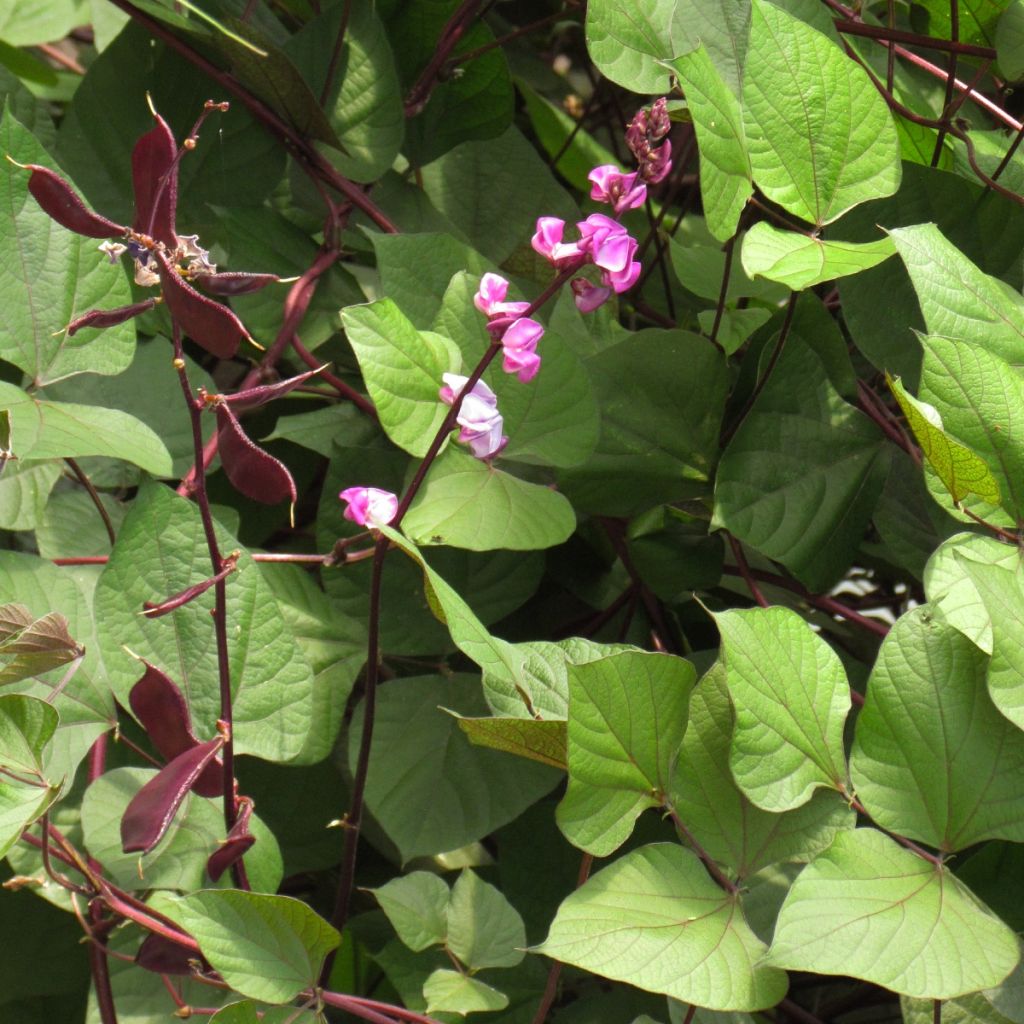

Graines de Dolichos lablab Ruby Moon - Lablab
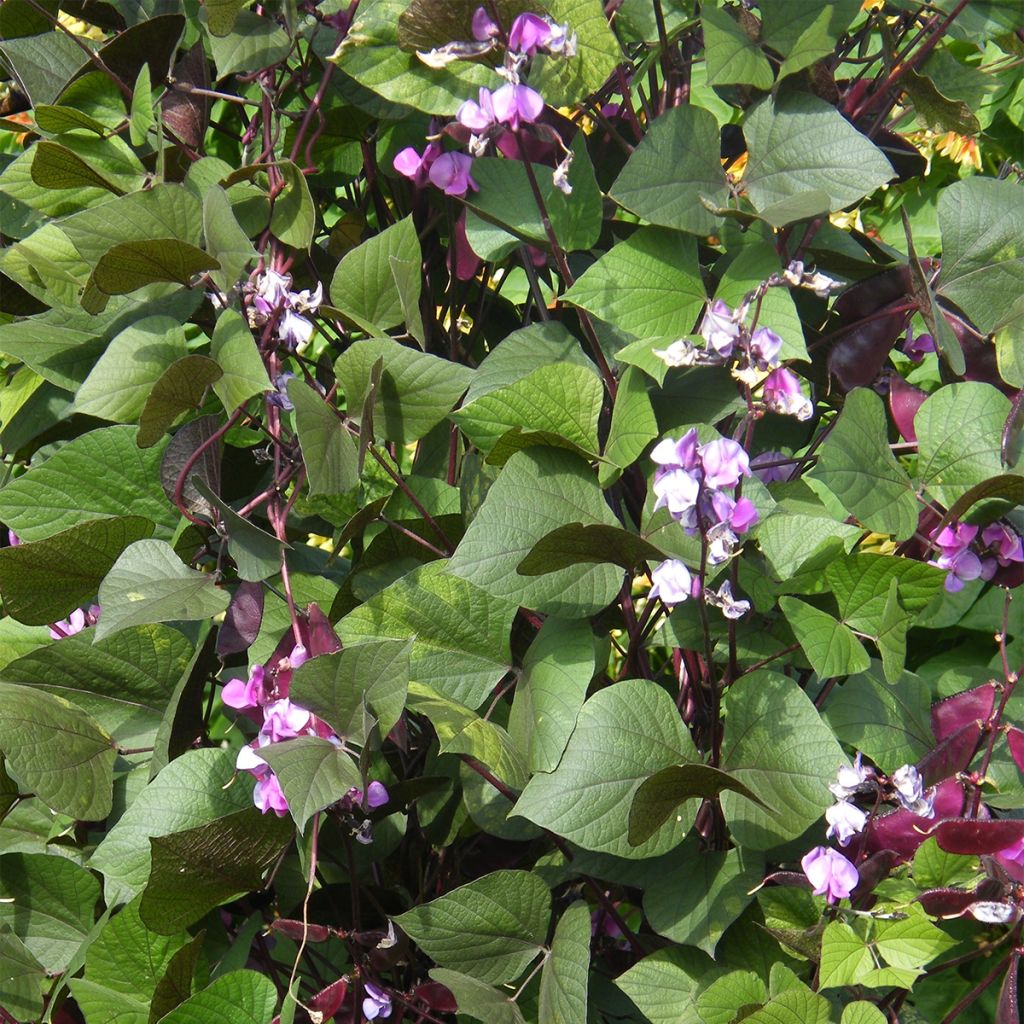

Graines de Dolichos lablab Ruby Moon - Lablab
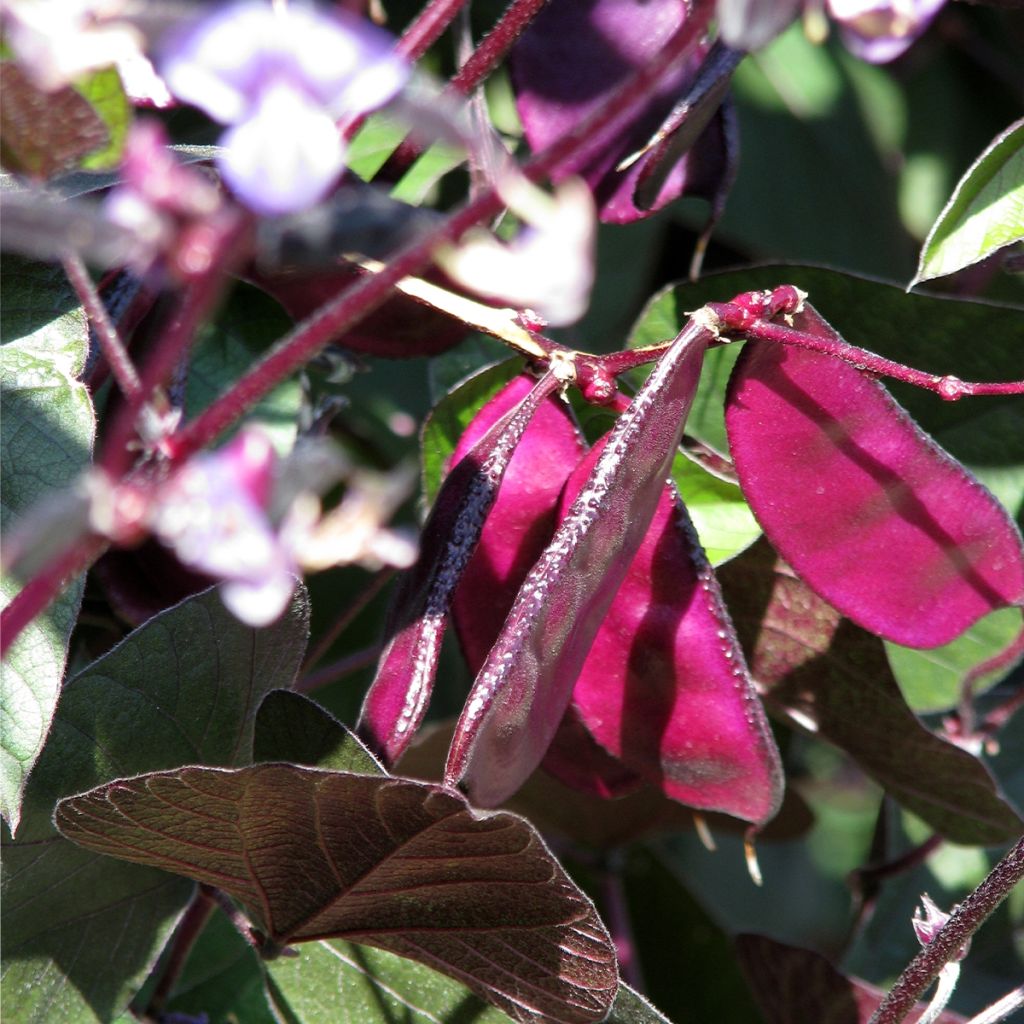

Graines de Dolichos lablab Ruby Moon - Lablab
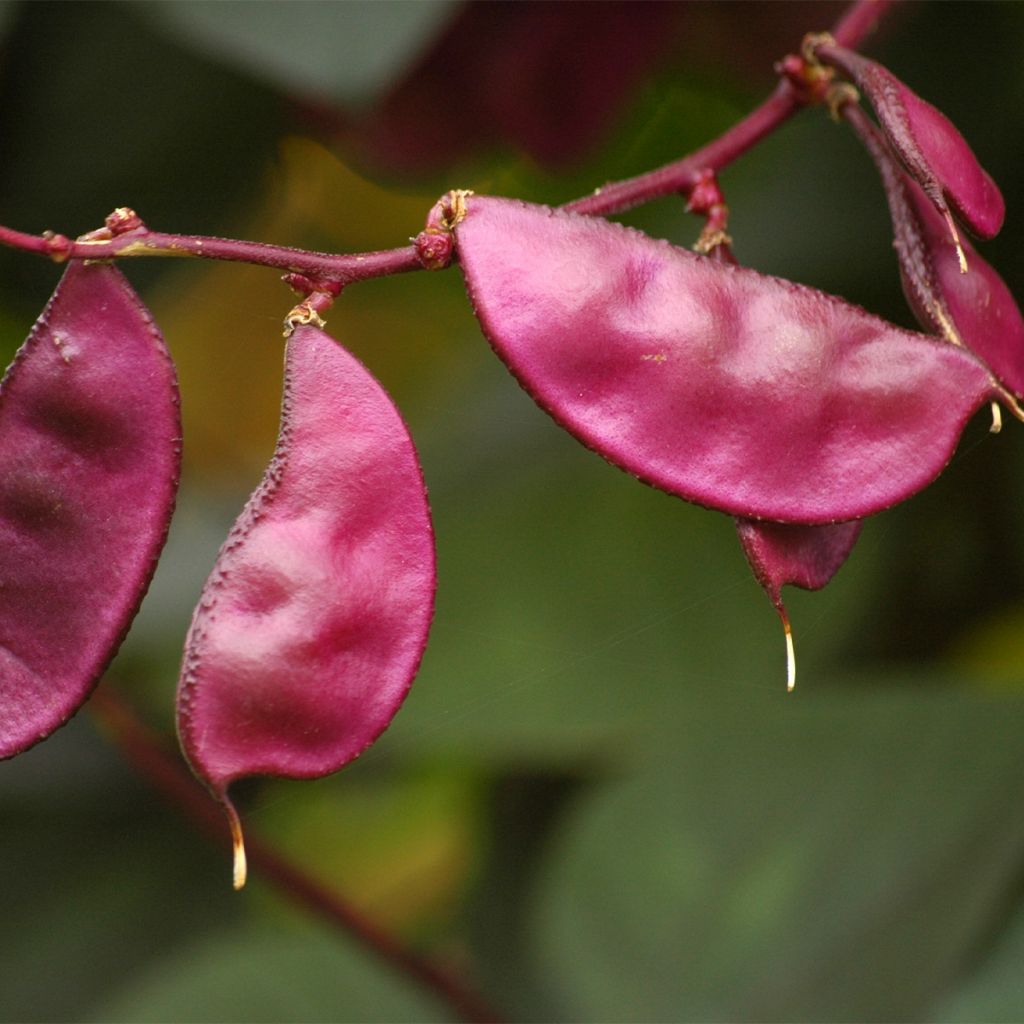

Graines de Dolichos lablab Ruby Moon - Lablab
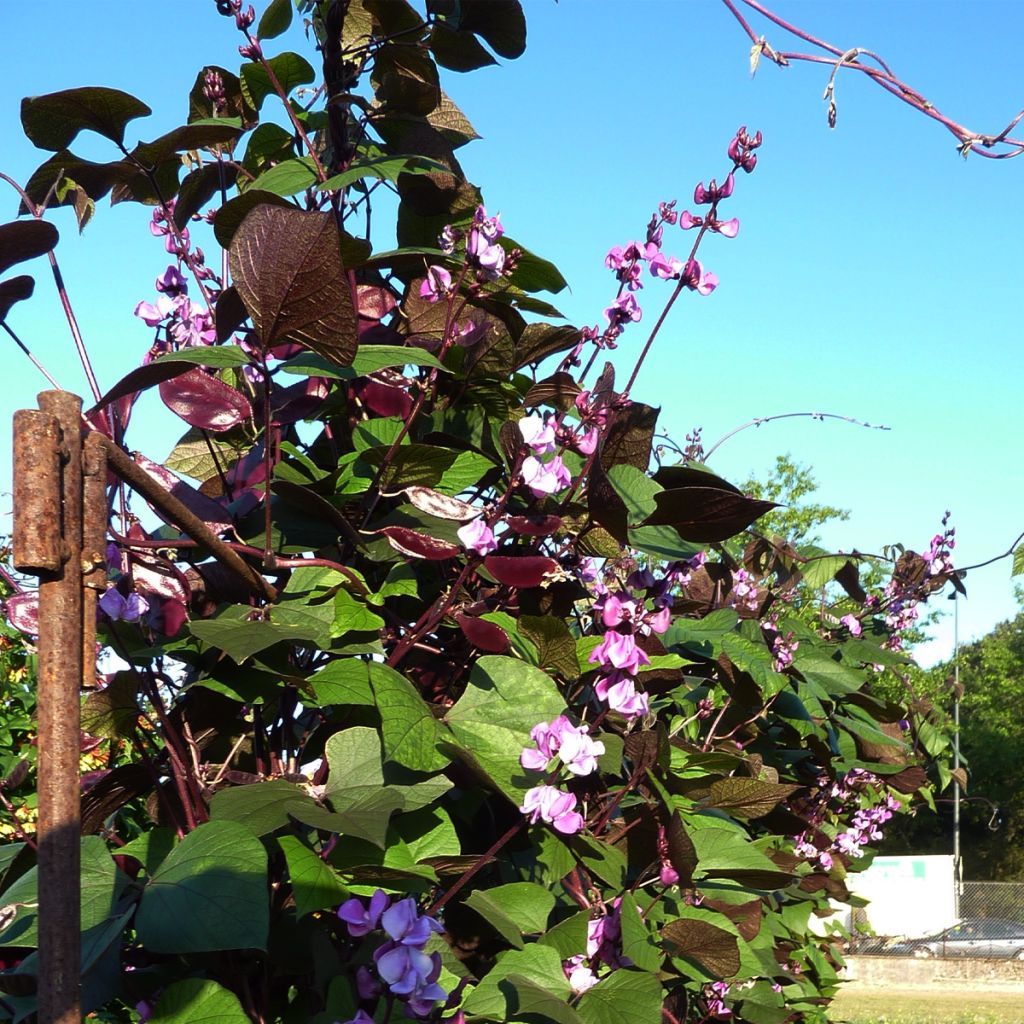

Graines de Dolichos lablab Ruby Moon - Lablab
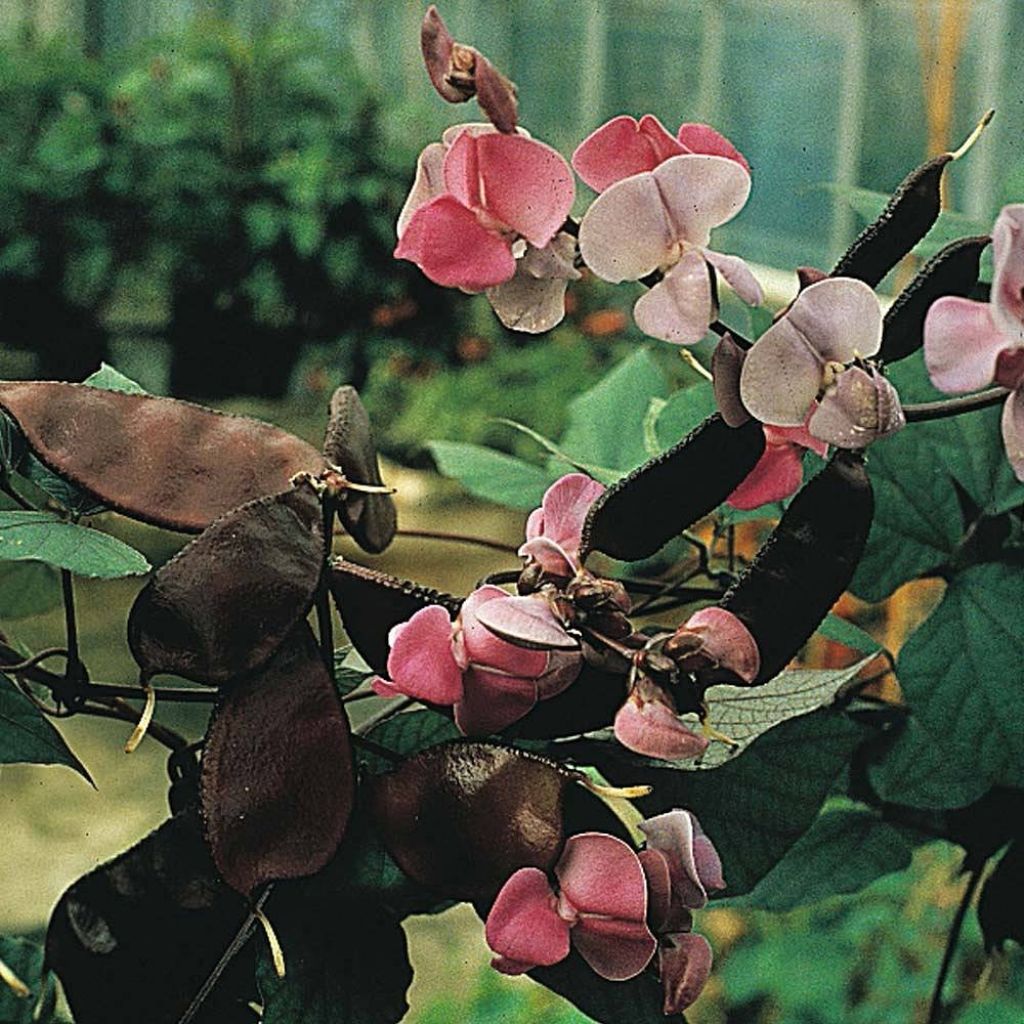

Dolichos Ruby Moon - Lablab Bean seeds
Dolichos Ruby Moon - Lablab Bean seeds
Dolichos lablab Ruby Moon
Hyacinth Bean, Lablab Bean, Bonavist Bean, Egyptian Kidney Bean
This item cannot be shipped to the selected country
Dispatch by letter from €3.90
More information
Schedule delivery date,
and select date in basket
This plant carries a 6 months recovery warranty
More information
We guarantee the quality of our plants for a full growing cycle, and will replace at our expense any plant that fails to recover under normal climatic and planting conditions.
Seed-only orders are dispatched by sealed envelope. The delivery charge for seed-only orders is €3.90.
Does this plant fit my garden?
Set up your Plantfit profile →
Description
Dolichos lablab 'Ruby Moon' is a compact and colourful selection of an African climbing plant that resembles a climbing bean. Its rapid growth and flowering allow it to be grown as an annual plant. With its beautiful bean-like foliage tinted with reddish-purple and pretty clusters of fragrant pink and lilac pea flowers in summer, followed by shiny almost purple pods in autumn, this small climber has many assets. Egyptian dolichos plants are perfect for covering a small wire fence, an arch or a trellis or for screening an annoying neighbour. They are undemanding, low-maintenance plants, very easy to grow in a sunny, warm and sheltered position.
Dolichos lablab, also known as Lablab purpureus, Lablab niger, Dolique lablab, Egyptian bean or Indian bean, is a tender perennial climbing plant from the bean family, Fabaceae. Its origins are believed to be in Central Africa, but it has been cultivated for a long time, especially in East Africa and Asia, as a vegetable plant and fodder for livestock. In Europe, it is mainly the ornamental qualities of selected forms that interest gardeners. It is usually grown as an annual in open ground or pots, although it can survive short frosts of around -7°C (19.4°F) under a thick protective mulch. This small climber can tolerate any well-drained soil, even shallow, chalky and poor.
'Ruby Moon' is slightly smaller than the species, with flowers in two shades, lilac pink and pale pink. The plant develops an extensive root system, capable of deep penetration into the soil to draw moisture. Its twining stems do not exceed 3m (10ft) and will naturally wrap around the support provided (stakes, wire mesh, trellis, shrub). They bear large, deeply veined leaves divided into 3 leaflets. The upper surface of the leaf is dark green, washed with purple and bronze, while the underside is purplish pink. Flowering begins approximately 5-6 weeks after sowing, as soon as the temperature exceeds 20°C (68°F), and lasts for almost 4 months. From July to September, numerous slender panicles of pea flowers, bicolour in pink and lilac, appear in the leaf axils. These pleasantly scented flowers attract many insects and butterflies. The flowers are followed by flattened, short and fairly wide, shiny, dark purple-violet pods with brown reflections. They contain small dark seeds that can be harvested for sowing the following spring.
Egyptian dolichos Ruby Moon is an original and highly ornamental plant that will fit well in ornamental gardens, in pots to adorn the terrace or balcony, or even in the vegetable garden. It can be used in the same way as sweet peas and morning glories, with which this climber pairs well. Let these annuals climb a tall teepee, a wire mesh, a small hut, or a trellis on a wall. While its water and nutrient requirements are low, Lablab needs long, warm summers to ripen its seeds.
Report an error about the product description
Dolichos Ruby Moon - Lablab Bean seeds in pictures
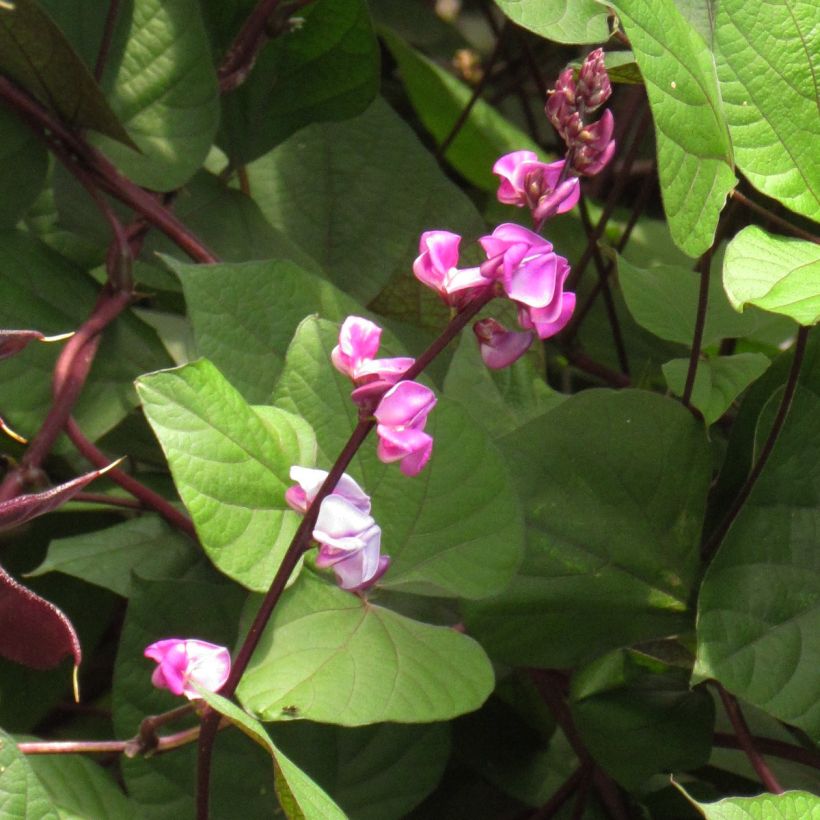

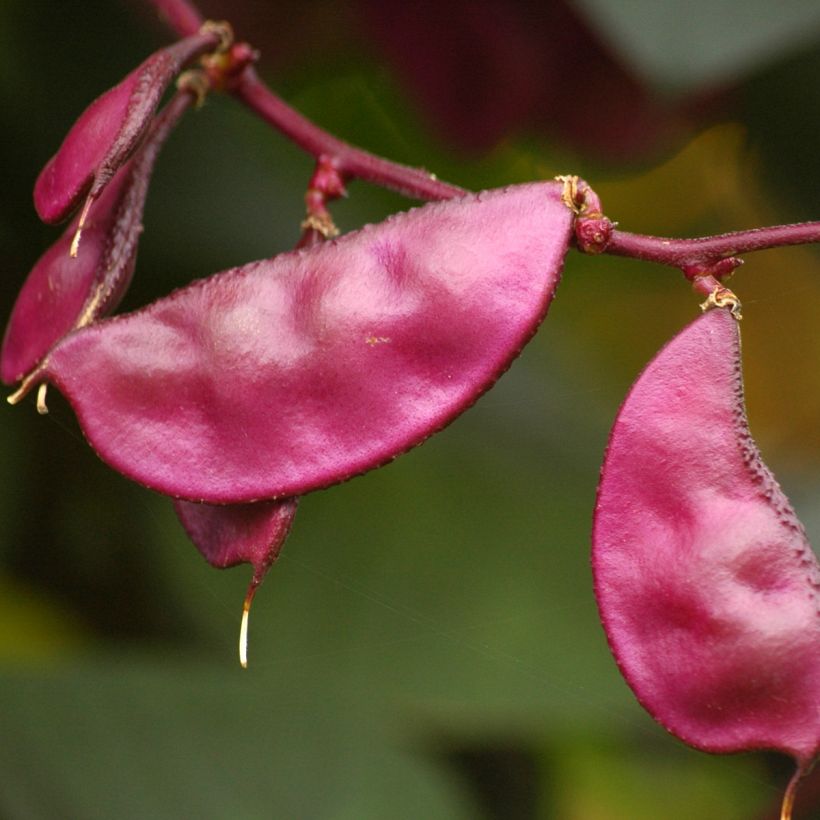

Flowering
Foliage
Plant habit
Botanical data
Dolichos
lablab
Ruby Moon
Fabaceae - Papillonaceae
Hyacinth Bean, Lablab Bean, Bonavist Bean, Egyptian Kidney Bean
Cultivar or hybrid
Other Flower seeds A to Z
Planting and care
Sowing:
For use in the garden as an annual plant, sow from March to May.
Sow in trays filled with good quality seed compost that sifted on the surface to bind the seed to it. Before sowing, lightly press down the soil with a board. Sow your seeds at a depth of 0.3 cm (0in). Cover the seeds by sprinkling soil on top or vermiculite, lightly press down and water generously with a fine spray. Place your tray in a well-lit area, without direct sunlight, at a temperature of 20°C to 25°C. Lower the temperature at night to 20°C to create a beneficial alternation for germination. The seeds will germinate in 5 to 14 days at 20-25 °C. Once the seedlings have appeared, you can lower the temperature to between 15 and 20°C.
When the plants are ready to be handled, transplant them into 7.5 cm (3in) pots. Keep the soil moist but not wet during growth. 15 days before their final planting, start gradually acclimatising them to a temperature of 15°C.
Cultivation:
By the end of May, the temperature will be warm enough in the garden to plant your young plants in well-prepared and loosened soil. Choose a sunny, warm location sheltered from strong winds. Space your plants 1m (3ft) apart. You can also grow them in 25 cm (10in) diameter pots, which you can bring indoors during winter to protect them from frost in a cold greenhouse or a lightly heated conservatory.
Dolichos lablab does not need fertiliser in open ground. It is as easy to grow as beans in the vegetable garden. Once the plant is well established in open ground, it generally does not need watering, except in prolonged drought. This is especially true if your climate allows it to be grown as a perennial in open ground. Its crown can withstand short frosts of around -7°C in well-draining soil, protected by a thick mulch.
This plant does not have any specific enemies.
Sowing period
Intended location
This item has not been reviewed yet - be the first to leave a review about it.
Flower seeds
Haven't found what you were looking for?
Hardiness is the lowest winter temperature a plant can endure without suffering serious damage or even dying. However, hardiness is affected by location (a sheltered area, such as a patio), protection (winter cover) and soil type (hardiness is improved by well-drained soil).

Photo Sharing Terms & Conditions
In order to encourage gardeners to interact and share their experiences, Promesse de fleurs offers various media enabling content to be uploaded onto its Site - in particular via the ‘Photo sharing’ module.
The User agrees to refrain from:
- Posting any content that is illegal, prejudicial, insulting, racist, inciteful to hatred, revisionist, contrary to public decency, that infringes on privacy or on the privacy rights of third parties, in particular the publicity rights of persons and goods, intellectual property rights, or the right to privacy.
- Submitting content on behalf of a third party;
- Impersonate the identity of a third party and/or publish any personal information about a third party;
In general, the User undertakes to refrain from any unethical behaviour.
All Content (in particular text, comments, files, images, photos, videos, creative works, etc.), which may be subject to property or intellectual property rights, image or other private rights, shall remain the property of the User, subject to the limited rights granted by the terms of the licence granted by Promesse de fleurs as stated below. Users are at liberty to publish or not to publish such Content on the Site, notably via the ‘Photo Sharing’ facility, and accept that this Content shall be made public and freely accessible, notably on the Internet.
Users further acknowledge, undertake to have ,and guarantee that they hold all necessary rights and permissions to publish such material on the Site, in particular with regard to the legislation in force pertaining to any privacy, property, intellectual property, image, or contractual rights, or rights of any other nature. By publishing such Content on the Site, Users acknowledge accepting full liability as publishers of the Content within the meaning of the law, and grant Promesse de fleurs, free of charge, an inclusive, worldwide licence for the said Content for the entire duration of its publication, including all reproduction, representation, up/downloading, displaying, performing, transmission, and storage rights.
Users also grant permission for their name to be linked to the Content and accept that this link may not always be made available.
By engaging in posting material, Users consent to their Content becoming automatically accessible on the Internet, in particular on other sites and/or blogs and/or web pages of the Promesse de fleurs site, including in particular social pages and the Promesse de fleurs catalogue.
Users may secure the removal of entrusted content free of charge by issuing a simple request via our contact form.
The flowering period indicated on our website applies to countries and regions located in USDA zone 8 (France, the United Kingdom, Ireland, the Netherlands, etc.)
It will vary according to where you live:
- In zones 9 to 10 (Italy, Spain, Greece, etc.), flowering will occur about 2 to 4 weeks earlier.
- In zones 6 to 7 (Germany, Poland, Slovenia, and lower mountainous regions), flowering will be delayed by 2 to 3 weeks.
- In zone 5 (Central Europe, Scandinavia), blooming will be delayed by 3 to 5 weeks.
In temperate climates, pruning of spring-flowering shrubs (forsythia, spireas, etc.) should be done just after flowering.
Pruning of summer-flowering shrubs (Indian Lilac, Perovskia, etc.) can be done in winter or spring.
In cold regions as well as with frost-sensitive plants, avoid pruning too early when severe frosts may still occur.
The planting period indicated on our website applies to countries and regions located in USDA zone 8 (France, United Kingdom, Ireland, Netherlands).
It will vary according to where you live:
- In Mediterranean zones (Marseille, Madrid, Milan, etc.), autumn and winter are the best planting periods.
- In continental zones (Strasbourg, Munich, Vienna, etc.), delay planting by 2 to 3 weeks in spring and bring it forward by 2 to 4 weeks in autumn.
- In mountainous regions (the Alps, Pyrenees, Carpathians, etc.), it is best to plant in late spring (May-June) or late summer (August-September).
The harvesting period indicated on our website applies to countries and regions in USDA zone 8 (France, England, Ireland, the Netherlands).
In colder areas (Scandinavia, Poland, Austria...) fruit and vegetable harvests are likely to be delayed by 3-4 weeks.
In warmer areas (Italy, Spain, Greece, etc.), harvesting will probably take place earlier, depending on weather conditions.
The sowing periods indicated on our website apply to countries and regions within USDA Zone 8 (France, UK, Ireland, Netherlands).
In colder areas (Scandinavia, Poland, Austria...), delay any outdoor sowing by 3-4 weeks, or sow under glass.
In warmer climes (Italy, Spain, Greece, etc.), bring outdoor sowing forward by a few weeks.

































